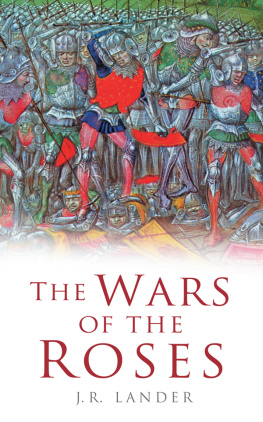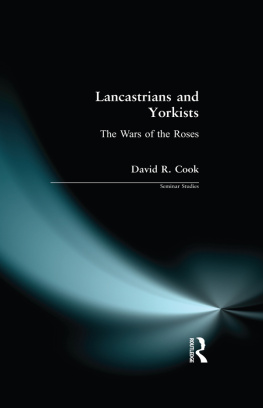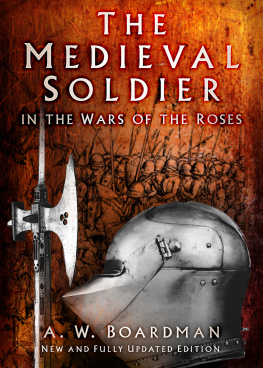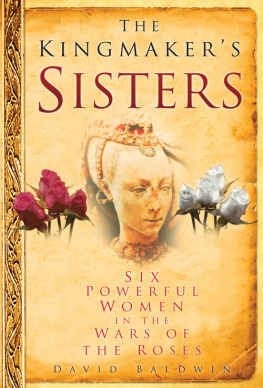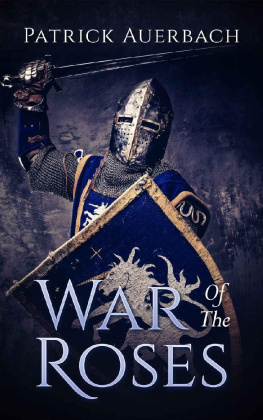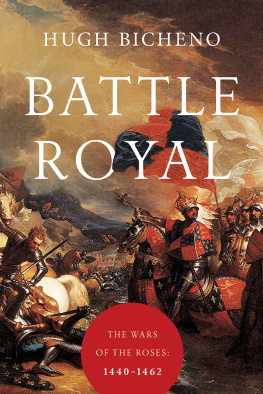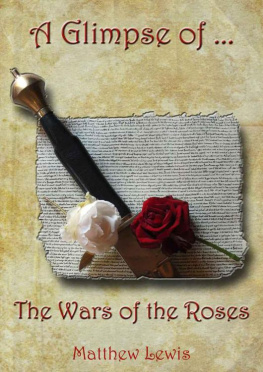ONE
The House of Lancaster
W hen in 1399 Henry of Derby, the heir of John of Gaunt, Duke of Lancaster, fourth son of the great Edward III, usurped the throne from his cousin, Richard II, he concealed the flaws in his title in a vague and evasive declaration in parliament:
In the name of Father, Son and Holy Ghost, I Henry of Lancaster challenge this realm of England, and the crown with all the members and the appurtenances, als I that am descended by right line of the blood coming from the good lord King Henry third, and through that right that God of his grace hath sent me, with help of my kin and of my friends to recover it: the which realm was in point to be undone for default of governance and undoing of the good laws.()
In so doing he ignored the claims of the Mortimer family, descending through a woman, Philippa, the daughter of Lionel of Clarence, the third son of Edward III. These claims after 1425 passed to her great-grandson, Richard, Duke of York. There was no certain rule of succession to the English crown at this time. Should the inheritance descend to the heir male or to the heir general? For the time the claims of the heir general lay dormant but potentially dangerous. Only success could justify the House of Lancaster in continued possession of the throne. Henry Vs renewal of the Hundred Years War in France soon lost its appeal for any except the soldiers who directly profited from his campaigns and the merchants who victualled his armies. Henry bought his triumphs against the Valois at the cost of mounting resentment at the high taxation which he levied on the rest of the community to pay for them. By 1421 many men echoed the indignant wail on which Adam of Usk ended his Chronicle:
And, seeking to avenge it)
After Henrys premature death the following year, the English in France, led by his brother John, Duke of Bedford, for a time extended their conquests. From about 1429, however, the French began to gain ground against the English. By 1435, with the death of John of Bedford and the failure of peace negotiations the result of almost insanely presumptuous demands which the English made at the conference of Arras the French war had reached a crisis. Sir John Fastolf, one of the most experienced of the war captains, advised that Henrys Vs policy of conquest and consolidation by the maintenance of garrisons had become too expensive. Terror and a scorched-earth policy were his recommendations for the future:
... First, it seemeth... that the king should do lay no sieges nor make no conquest out of Normandy, or to conquest by way of siege as yet; for the sieges hath greatly hindered his conquest in time passed, and destroyed his people, as well lords, captains, and chieftains, as his other people, and wasted and consumed innumerable good of his finances, both in England and in France, and in Normandy. For there may no king conquer a great realm by continual sieges, and specially seeing the habiliments and ordnances that be-eth this day used for the war, and the knowledge and experience that the enemies have therein, both in keeping of their places and otherwise; and also the favour that they find in many that should be the kings true subjects.
Wherefore... it is thought right expedient, for the speed and the advancement of the kings conquest and destroying of his enemies, to ordain two notable chieftains, descreet and of one accord, having either of them seven hundred and fifty spears of well chosen men, and they to hold the field continually and oostay,)
In these unhappy circumstances Henry VI and his later foe, Richard, Duke of York, came to the forefront of politics for the first time. Henry, at the age of fifteen, signed his first royal warrant in December 1436. Richard of York had taken part in a Great Council at Westminster in April and May 1434 and in January 1435 (he was then twenty-four) the royal council appointed him Lieutenant and Governor of France and Normandy. Many years later John Blacman, a Carthusian monk who had been one of Henrys chaplains, wrote a memoir of his master. He depicted an extreme form of a contemporary type of intense lay piety an English variation of the devotio moderna: bliss to a monk of a strict contemplative order, disastrous for a people in days when a king must rule as well as reign:
He was, like a second Job, a man simple and upright, altogether fearing the Lord God, and departing from evil. He was a simple man, without any crook of craft or untruth, as is plain to all. With none did he deal craftily, nor ever would say an untrue word to any, but framed his speech always to speak truth.
He was both upright and just, always keeping to the straight line of justice in his acts. Upon none would he wittingly inflict any injustice. To God and the Almighty he rendered most faithfully that which was His, for he took pains to pay in full the tithes and offerings due to God and the church: and this he accompanied with most sedulous devotion, so that even when decked with the kingly ornaments and crowned with the royal diadem he made it a duty to bow before the Lord as deep in prayer as any young monk might have done...
... And that this prince cherished a sons fear towards the Lord is plain from many an act and devotion of his. In the first place, a certain reverend prelate of England used to relate that for ten years he held the office of confessor to King Henry; but he declared that never throughout that long time had any blemish of mortal sin touched his soul...
.... A diligent and sincere worshipper of God was this king, more given to God and to devout prayer than to handling worldly and temporal things, or practising vain sports and pursuits: these he despised as trifling, and was continually occupied either in prayer or the reading of the scriptures or of chronicles, whence he drew not a few wise utterances to the spiritual comfort of himself and others...
... This King Henry was chaste and pure from the beginning of his days. He eschewed all licentiousness in word or deed while he was young; until he was of marriageable age, when he espoused the most noble lady, Lady Margaret, daughter of the King of Sicily, by whom he begat one only son, the most noble and virtuous Prince Edward; and with her and toward her he kept his marriage vow wholly and sincerely, even in the absences of the lady, which were sometimes very long: never dealing unchastely with any other woman. Neither when they lived together did he use his wife unseemly, but with all honesty and gravity.
... It happened once, that at Christmas time a certain great lord brought before him a dance or show of young ladies with bared bosoms who were to dance in that guise before the king, perhaps to prove him, or to entice his youthful mind. But the king was not blind to it, nor unaware of the devilish wile, and spurned the delusion, and very angrily averted his eyes, turned his back upon them, and went out to his chamber, saying:
Fy, fy, for shame, forsothe ye be to blame.
At another time, riding by Bath, where are warm baths in which they say the men of that country customably refresh and wash themselves, the king, looking into the baths, saw in them men wholly naked with every garment cast off. At which he was displeased, and went away quickly, abhorring such nudity as a great offence, and not unmindful of that sentence of Francis Petrarch the nakedness of a beast is in men unpleasing, but the decency of raiment makes for modesty...
... I would have you know that he was most eminent for that virtue of humility. This pious prince was not ashamed to be a diligent server to a priest celebrating in his presence, and to make the responses at the mass, as Amen, Sed libera nos, and the rest. He did so commonly even to me, a poor priest. At table even when he took a slight refection, he would (like a professed religious) rise quickly, observe silence, and devoutly give thanks to God standing on every occasion. Also on the testimony of Master Doctor Towne, he made a rule that a certain dish which represented the five wounds of Christ as it were red with blood, should be set on his table by his almoner before any other course, when he was to take refreshment; and contemplating these images with great fervour he thanked God marvellous devoutly...

